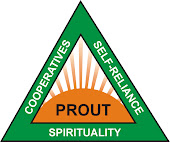"Progressive" is not an iconic moniker for a sectarian perspective, "Progressive" is the continuity of the Universe to move from crude toward subtle, a momentum innate in and substantially exalted through the sublimity of human evolution.
This is Progressive Utilization, for flourishing the wellbeing and happiness of all, in every realm of life. Explore this magnanimous paradigm through the dedicated postings below and the menu and links to your right.
Thursday, July 28, 2011
Proutistic Solutions for Crime and Punishment
PROUT seeks to solve many existing problems in a creative, integrated way. No problems exist outside a larger social context, so it is necessary to address the very root causes. Here we shall address aspects of PROUT regarding crime, population, and the environment. Any one could of course be discussed at great length.
Crime and Punishment
The concept of justice is largely dependent upon society at a particular time and level of development. What is justice for one society may not be accepted as justice by another society. The common conception of justice is that there should be fair punishment to fit a crime. This is a kind of trader’s justice – an exchange where harm done must be paid in full. But this is a relative process. What is justice in one era, or in a particular society, may not be the same in a different time or place.
PROUT advocates that reformation should be more important than punishment. As humans, we are incapable of perfect judgment and will always have a limited capacity of evaluation. Hence we should not have the right to punish each other, only to correct each other as best as we are able. Therefore justice under PROUT is to be a code of corrective measures. And in such a world of relative justice, a great importance must be put upon the selection of judges. Judges need to be learned and possess penetrating intellects. They must also have indisputably good character.
Under the trial system there is much scope for error. There is no way to verify the testimony of witnesses. Investigators should research and present evidence too. Relying on lawyers’ interpretations is too dangerous; clever lawyers can be troublesome within the trial system. Perhaps judges should be able to make final decisions, with juries acting as their assistants. There should also be an appeals procedure to go along with this system.
Criminals should not all be classified the same way. There are many different reasons that people turn to crime. PROUT recognizes five distinct criminal types. First, there are criminals by instinct. Generally these are quiet people who enjoy petty crimes. Though easily instigated by others, this class of criminal typically does not commit major crimes. However, they are not easily educated so rehabilitation may be difficult.
The second category consists of those who are criminals by habit. People in this category may or may not be intelligent, but they revel in cruelty and are unable to understand compassion. Generally they are quite clever in committing their crimes. They also tend to become addicted to criminal behavior, and possess low moral strength. However, they are capable of being cured of this defect through rehabilitation.
A third class of criminals become so due to their environment. Family or peer pressures are the most common cause of this defect. Often parents with depraved tendencies will pass them on to their children. In dealing with these individuals it is important to discover where the bad influence comes from so that it can be dealt with. People who fall into this category are likely to degenerate even further if they are put into prison with those who are criminals by habit.
Criminals by necessity make up the fourth category. Most of the crimes in this world are motivated because of want of the basic necessities. Under PROUT, society will increasingly provide the basic necessities, and this category of criminals should be eliminated. People who do fall into this category ought to create social pressure to force a change in their circumstances. Society has no right to judge such behavior, since society itself is responsible for it.
The fifth and final category of criminals are those who become so through snap volition. This is a treatable mental condition. It expresses itself in temporary mental ailments such as crimes of passion or kleptomania. Mental rehabilitation here would be more effective than imprisonment.
Labels:
alternative economy,
capital punishment,
crime,
criminality,
humane,
injustice,
justice,
law,
legal,
penal system,
progressive,
punishment
Subscribe to:
Posts (Atom)
